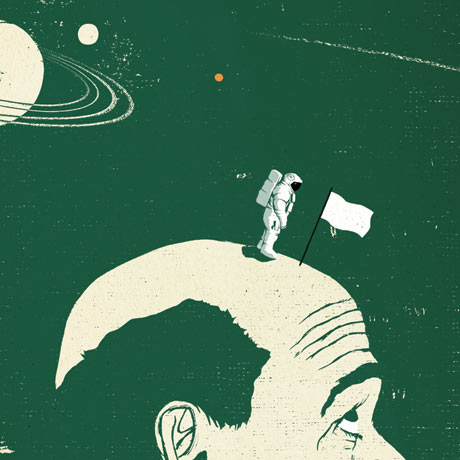
One fascinating way to understand the psychological power of borders is to visit Four Corners Monument, where the US states of Arizona, New Mexico, Colorado and Utah intersect. By fascinating, I mean forehead-smackingly dull, because the monument is really just a concrete slab in a car park. You stand on it, wonder why you're spending the prime of your adulthood standing on concrete slabs in the middle of nowhere, then leave feeling underwhelmed. But that underwhelm is interesting, since it implies you'd been expecting more. Why, though? Except in certain hot spots where they're fortified – the occupied territories, cold war Berlin – physical borders often mean little. Yet in our minds, they're freighted with meaning, influencing us even when it comes to matters of life and death.
Recently, two psychologists working not far from that concrete slab, at the University of Utah, presented people with various scenarios involving where to build a home. Some were told there'd been an earthquake 200 miles away in a neighbouring state; others that there'd been one 200 miles away, but in the same state. They were shown maps, to underline the distances involved – and yet they deemed the risk of earthquakes a bigger problem when they occurred inside state lines. A second test, involving radioactive waste in a next-door state, reached a related conclusion: the risk was seen as smaller when the boundary on the map was drawn in a thicker line. Mental maps guide our lives, but they're quirky; as the psychologist Wray Herbert, discussing the research in Scientific American, put it, "The mapmaker in our neurons favours the category over actual proximity."
The Utah researchers called this "border bias", and it has obvious implications for disaster preparedness, and for how seriously we take various border-transcending threats, most obviously global warming. But it calls to mind, too, a border so psychologically fundamental, most of us don't think of it as one: the border between yourself and everything else. Even this boundary, when you stop to consider it, is arguably just another distinction made in the mind, a cognitive category rather than something "out there" in the world.
This notion of the separate self as somehow unreal has traditionally been the preserve of mysticism, and new age books with psychedelic jackets, but as Julian Baggini's new and emphatically non-crystal-worshipping book on the subject, The Ego Trick, makes clear, there's no real reason for that. The point is straightforward: we habitually think of ourselves, as the writer Alan Watts liked to put it, as "an ego in a bag of skin", using our skin to define the boundary between "me" and "not me". Yet the rationale for this is dubious. Is it that you control what's inside your skin and not what's outside? Not really: you don't control your digestive system, to pick one example, and you can control plenty of things beyond your skin. Is it a distinction of chemistry? Nope: "Whatever stuff you are made from," Baggini points out, "is the same kind of stuff that everything else is made of." The decision to see yourself as a separate thing may be highly practical, day to day, but it's still a decision. The feeling of a separate self, from this viewpoint, is a kind of border bias. Internalise this, wrote Watts, and you'll see that "the sense of being 'me' is exactly the same sensation as being one with the whole cosmos". Sure, he took a fair bit of LSD. But it's not a bad point.
• oliver.burkeman@theguardian.com; twitter.com/oliverburkeman

